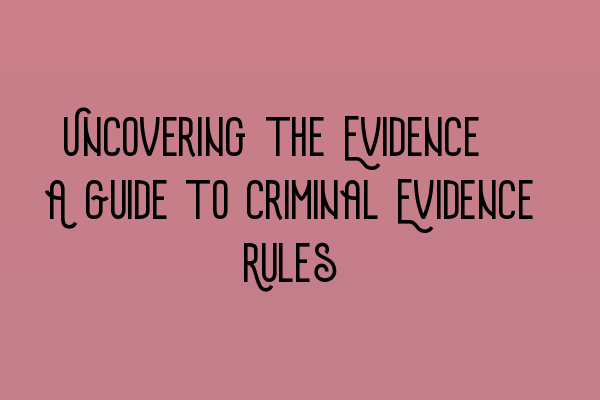Uncovering the Evidence: A Guide to Criminal Evidence Rules
When it comes to criminal law, evidence plays a crucial role in determining guilt or innocence. Understanding the rules and procedures surrounding criminal evidence is essential for every legal professional. In this comprehensive guide, we will delve into the intricacies of criminal evidence and shed light on the key principles that govern its admission and exclusion in court.
The Importance of Criminal Evidence
Criminal evidence serves as the foundation for a fair and just legal system. It enables the prosecution to present proof of the defendant’s guilt beyond a reasonable doubt, while also allowing the defense to challenge the validity and integrity of the evidence presented against their client. The admissibility of evidence is subject to certain guidelines and rules that promote fairness and accuracy in criminal trials.
Types of Criminal Evidence
There are several types of evidence that may be presented in criminal trials, including:
- Direct evidence: This type of evidence directly proves a fact without the need for any inference or presumption. It can be in the form of eyewitness testimony, confessions, or video/audio recordings.
- Circumstantial evidence: Also known as indirect evidence, circumstantial evidence requires the jury to make inferences based on the circumstances surrounding the case. It indirectly establishes a fact by showing other circumstances that lead to a logical conclusion.
- Expert evidence: Expert witnesses provide specialized knowledge or opinions about specific areas related to the case. Their testimony helps the jury understand complex concepts and make informed decisions.
- Character evidence: Character evidence aims to establish a person’s general character or reputation as relevant to the case. It can be either favorable or unfavorable to the accused.
- Physical evidence: Physical evidence refers to tangible objects or materials that are directly related to the case, such as weapons, fingerprints, DNA samples, or drug paraphernalia.
Rules of Evidence
In the UK, the rules of evidence are primarily established by the Criminal Procedure Rules and case law. These rules govern the admissibility and exclusion of evidence in criminal proceedings. Adhering to these rules is crucial to ensure a fair trial and maintain the integrity of the judicial process.
Some key rules of evidence include:
- The hearsay rule, which generally excludes statements made out of court from being admitted as evidence unless they fall within certain exceptions. This rule aims to prevent the use of unreliable or second-hand information.
- The best evidence rule, which requires the presentation of the original or best available evidence to prove a fact. This rule aims to prevent the use of secondary evidence that may be less reliable.
- The exclusionary rule, which allows for the exclusion of evidence that has been obtained unlawfully or in violation of an individual’s rights. This rule aims to protect the Fourth and Fifth Amendment rights of defendants in criminal cases.
- The relevance rule, which mandates that evidence must be relevant to the issues at hand in order to be admissible. Irrelevant evidence is generally excluded as it has no probative value.
Challenges to Evidence
The defense has the right to challenge the admissibility and credibility of the evidence presented by the prosecution. Common challenges to evidence include:
- Alleging chain of custody issues to challenge the integrity and authenticity of physical evidence.
- Questioning the expertise and qualifications of an expert witness to challenge the reliability of their testimony.
- Objecting to the relevance of certain evidence that may be prejudicial or immaterial to the case.
- Arguing that the evidence was obtained unlawfully or in violation of the defendant’s constitutional rights.
Uncovering the evidence is a crucial aspect of criminal defense. By analyzing the rules of evidence and strategically challenging its admissibility, legal professionals can effectively advocate for their clients’ rights and ensure a fair trial.
For further preparation and practice, we recommend exploring our related articles:
- SQE 1 Practice Exam Questions
- SQE 1 Practice Mocks FLK1 FLK2
- SQE 2 Preparation Courses
- SQE 1 Preparation Courses
- SRA SQE Exam Dates
By staying well-versed in criminal evidence rules and regularly practicing with SQE exam materials, you can enhance your knowledge and skills in this critical area of criminal law.
